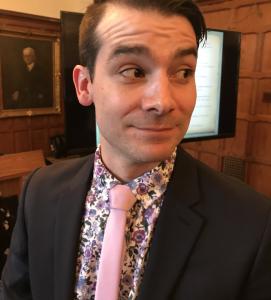Mark Lambert

In my dissertation, I ask: What is the hermeneutical relationship between illness and theological symbols? Or more importantly: What is the unique, explanatory purchase of theological symbols vis-à-vis the experience of illness and what—if any—ethical demands does that experience of illness present to the interpretation of theological symbols? To that end, I address how the construal of theological symbols affects the ethical status of people with an acutely stigmatizing—and theologically freighted—illness such as leprosy. I especially focus on the relationship between stigmatic illness and medieval sacramental theology, specifically the Franciscan reading of leprosy in unison with the sacrament of the Eucharist. I then examine this theological synthesis of leprosy and the Eucharist in the practical setting of the Molokai leprosy settlement (in late nineteenth-, early twentieth-century Hawaii) and the ministries of Father Damien De Veuster and Mother Marianne Cope. For medieval Franciscan theologians, Father Damien, and Mother Marianne, leprosy was not so much an object of theologizing as it was a unique resource for informing and enriching the work of theology—a model that I argue has practical, ethical ramifications for how religious communities today approach stigmatic illness, e.g. HIV/Aids, mental illness, or neglected tropical diseases.
During the course of the Marty Seminar, I will largely focus on completing the final chapter of my dissertation that surveys the theological work of Father Damien and Mother Marianne. In this chapter, I knit together the historical insights of medieval theology with the medical history of nineteenth-century Hawaii (one conditioned by the power structures of colonial health politics and race relations) before pivoting to the ramifications of my work for contemporary biomedical ethics. I have long admired the work of the Martin Marty Center and its commitment to facilitating dialogue between the academic study of religion and the concerns of the wider public. I am especially attracted to the conviction of the Marty Seminar that the most innovative and robust scholarship is forged in the company of a community of peers. I look forward to subjecting my ideas to sustained conversation and critique by those with contrasting methodologies and assumptions, and am confident that at the end of this fellowship I will be a better scholar and more importantly, a better colleague.

